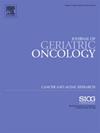Patterns of presentation, treatment, and survival among older adults with metastatic breast cancer: Results from a large prospective registry
IF 3
3区 医学
Q3 GERIATRICS & GERONTOLOGY
引用次数: 0
Abstract
Introduction
Older adults with breast cancer experience worse survival than their younger counterparts. However, data are limited on the patterns of presentation, treatment, and outcomes for older patients with metastatic breast cancer (MBC) outside of registry studies and selected clinical trial populations.
Materials and Methods
We identified patients aged ≥60 years from a single, NCI-designated cancer center with MBC diagnosed between 1999 and 2022. Using Chi-square testing, we compared clinicopathologic characteristics by age. We also examined treatment patterns and reasons for treatment discontinuation; overall survival (OS) was examined by subtype and age using Kaplan-Meier methods.
Results
The final analytic cohort included 1115 patients with a median follow-up of 2.9 years (1.0–18.5); median age at metastatic diagnosis was 66.3 (60.0–95.4). Disease subtypes included: 70.7 % hormone receptor-positive (HR+)/human epidermal growth factor receptor 2-negative (HER2-), 11.9 % any HR/HER2+, 17.4 % triple negative (TN). In those with HR+/HER2- disease receiving first-line (1 L) therapy (n = 783), 1 L endocrine-based therapy was frequent (79.3 % for ages 60–65, 94.7 % for >80), and administration of 1 L chemotherapy varied by age (21.0 % in ages 60–65, 5.3 % in >80). Among those with TN and HER2+ disease, ≥84 % received a 1 L chemotherapy or trastuzumab-containing regimen. Across subtypes, most patients (80.5 %) discontinued 1 L therapy for progression, not toxicity. Among patients ages 60–65, 16.5 % stopped treatment after 1 L therapy; 42.2 % of those >age 80 received treatment after 1 L. Clinical trial enrollment declined with age (40 % in 60–65 vs. 13 % for >80; p = 0.0004), as did median OS (4.4 years in ages 60–65 vs. 2.7 years for >80; p < 0.005). For ages 60–65, 37.8 %, 17.1 %, and 40.3 % with HR + HER2-, TN, and HER2+ disease, respectively, were alive at two years. For ages >80, 23.7 %, 0 %, and 33.3 % with HR + HER2-, TN, and HER2+ disease, respectively, were alive at two years.
Discussion
In a unique, large prospective cohort of older adults with MBC, the number of treatment lines decreased with increasing age, and OS outcomes were poor, particularly for those >80 years where most patients were not alive at two years after MBC diagnosis. Therapeutic approaches, with improved supportive care, are urgently needed to optimize outcomes in the oldest patients with MBC.
老年转移性乳腺癌的表现、治疗和生存模式:来自一项大型前瞻性登记的结果
老年乳腺癌患者的生存率比年轻乳腺癌患者差。然而,在注册研究和选定的临床试验人群之外,关于老年转移性乳腺癌(MBC)患者的表现、治疗和结局模式的数据有限。材料和方法我们从一个nci指定的癌症中心筛选出年龄≥60岁的1999年至2022年间诊断为MBC的患者。使用卡方检验,我们比较不同年龄的临床病理特征。我们还研究了治疗模式和停止治疗的原因;采用Kaplan-Meier法分亚型和年龄检测总生存期(OS)。结果最终分析队列包括1115例患者,中位随访2.9年(1.0-18.5年);转移诊断的中位年龄为66.3岁(60.0-95.4岁)。疾病亚型包括:激素受体阳性(HR+)/人表皮生长因子受体2阴性(HER2-)占70.7%,任何HR/HER2+占11.9%,三阴性(TN)占17.4%。在接受一线(1 L)治疗的HR+/HER2-疾病患者(n = 783)中,1 L内分泌基础治疗较为常见(60-65岁为79.3%,80岁为94.7%),1 L化疗的使用因年龄而异(60-65岁为21.0%,80岁为5.3%)。在患有TN和HER2+疾病的患者中,≥84%的患者接受了1l化疗或含曲妥珠单抗的方案。在所有亚型中,大多数患者(80.5%)因进展而非毒性而停止1l治疗。在60-65岁的患者中,16.5%的患者在1l治疗后停止治疗;在80岁的患者中,有42.2%的患者在1年后接受了治疗。临床试验的入组率随着年龄的增长而下降(60-65岁为40%,80岁为13%;p = 0.0004),中位OS(60-65岁4.4年vs 80岁2.7年;p & lt;0.005)。对于60-65岁的患者,分别有37.8%、17.1%和40.3%的HR + HER2-、TN和HER2+疾病患者在两年时存活。80岁时,23.7%、0%和33.3%的HR + HER2-、TN和HER2+疾病患者两年时存活。在一个独特的、大型的老年MBC前瞻性队列中,治疗线的数量随着年龄的增长而减少,OS结果很差,特别是对于那些80岁以上的患者,其中大多数患者在MBC诊断后两年内已经死亡。迫切需要治疗方法和改进的支持性护理来优化老年MBC患者的预后。
本文章由计算机程序翻译,如有差异,请以英文原文为准。
求助全文
约1分钟内获得全文
求助全文
来源期刊

Journal of geriatric oncology
ONCOLOGY-GERIATRICS & GERONTOLOGY
CiteScore
5.30
自引率
10.00%
发文量
379
审稿时长
80 days
期刊介绍:
The Journal of Geriatric Oncology is an international, multidisciplinary journal which is focused on advancing research in the treatment and survivorship issues of older adults with cancer, as well as literature relevant to education and policy development in geriatric oncology.
The journal welcomes the submission of manuscripts in the following categories:
• Original research articles
• Review articles
• Clinical trials
• Education and training articles
• Short communications
• Perspectives
• Meeting reports
• Letters to the Editor.
 求助内容:
求助内容: 应助结果提醒方式:
应助结果提醒方式:


